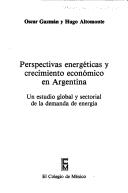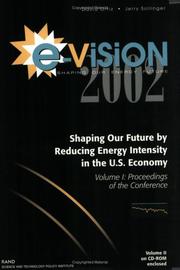| Listing 1 - 10 of 31 | << page >> |
Sort by
|
Book
ISBN: 9535162543 953510800X Year: 2012 Publisher: IntechOpen
Abstract | Keywords | Export | Availability | Bookmark
 Loading...
Loading...Choose an application
- Reference Manager
- EndNote
- RefWorks (Direct export to RefWorks)
This book is one of the most comprehensive and up-to-date books written on Energy Efficiency. The readers will learn about different technologies for energy efficiency policies and programs to reduce the amount of energy. The book provides some studies and specific sets of policies and programs that are implemented in order to maximize the potential for energy efficiency improvement. It contains unique insights from scientists with academic and industrial expertise in the field of energy efficiency collected in this multi-disciplinary forum.
Energy consumption. --- Consumption of energy --- Energy efficiency --- Fuel consumption --- Fuel efficiency --- Power resources --- Energy conservation --- Alternative & renewable energy sources & technology
Book
ISBN: 1000083924 3731508087 Year: 2018 Publisher: KIT Scientific Publishing
Abstract | Keywords | Export | Availability | Bookmark
 Loading...
Loading...Choose an application
- Reference Manager
- EndNote
- RefWorks (Direct export to RefWorks)
The book at hand shows possibilities to derive requirements from customers’ usage behaviour based on recorded vehicle data. The focus lies on the derivation of mobility and driving profiles for a computer aided calculation of the fuel consumption. On this basis, the calculated fuel consumption is integrated into the creation of life cycle assessments and total cost of ownership calculations in order to evaluate vehicle concepts.
fuel consumption --- user behaviour --- Plug-in Hybridfahrzeug --- plug-in hybrid electric vehicle --- Nutzerverhalten --- driving pattern --- Kraftstoffverbrauch --- Fahrprofil --- mobility behaviour --- Mobilitätsprofil

ISBN: 6076283629 9681202007 Year: 1982 Publisher: El Colegio de México
Abstract | Keywords | Export | Availability | Bookmark
 Loading...
Loading...Choose an application
- Reference Manager
- EndNote
- RefWorks (Direct export to RefWorks)
Es uno de los primeros ensayos latinoamericanos que intenta situar el análisis de la demanda energética en un marco próximo al de la economía política ampliando, con ello, las bases para una mejor interpretación de la realidad de los países de la región.
Power resources --- Industries --- Energy consumption --- Argentina --- Economic conditions --- Consumption of energy --- Energy efficiency --- Fuel consumption --- Fuel efficiency --- Energy conservation --- Industrial production --- Industry --- Economics --- Industries, Primitive --- Energy industries & utilities

ISBN: 1921313382 0731538137 9781921313387 9780731538133 9781921313382 Year: 2007 Publisher: Canberra, ACT : ANU E Press ; Asia Pacific Press ; Social Sciences Academic Press,
Abstract | Keywords | Export | Availability | Bookmark
 Loading...
Loading...Choose an application
- Reference Manager
- EndNote
- RefWorks (Direct export to RefWorks)
"China's prosperity is at the core of the emerging Platinum Age of global economic growth. Rapid economic growth has been underpinned by expansion in its domestic markets, and the integration of domestic and international markets in goods, services, capital, labour and foreign exchange. Global commodity prices have reached historic highs, while China's capital outflows have helped to hold down interest rates worldwide. Linking markets, both domestic and international, has been key to China's success. In sustaining its strong economic growth, China has become one of the world's most voracious consumers of energy. The challenge now facing the government and people of China is in achieving cooperation with the international community to avert the costs - both economic and environmental - of accelerating energy consumption. China - Linking Markets for Growth gathers together leading scholars on China's economic success and its effect on the world economy into the next few decades."
Free enterprise --- International business enterprises --- Labor market --- Energy consumption --- Business & Economics --- Economic History --- China --- Economic conditions. --- Commercial policy. --- Consumption of energy --- Energy efficiency --- Fuel consumption --- Fuel efficiency --- Power resources --- Energy conservation

ISBN: 0833033433 0833035916 9780833035912 9780833033437 Year: 2003 Publisher: Santa Monica, CA RAND
Abstract | Keywords | Export | Availability | Bookmark
 Loading...
Loading...Choose an application
- Reference Manager
- EndNote
- RefWorks (Direct export to RefWorks)
The E-Vision 2002 Conference, held in May 2002, was sponsored by the U.S. Department of Energy as a step toward implementing a key recommendation of the Bush administration?s National Energy Policy. It gathered 150 of the nation?s leading energy experts to discuss ways of reducing the country?s energy intensity. This volume and the additional volume enclosed on CD-ROM contain the presentations and discussions that took place at the conference, including the identification of goals and the means to achieve them. It is a key work for those involved in implementing the National Energy Policy.
Energy consumption--United States--Congresses. --- Energy policy--United States--Congresses. --- Industrial productivity--United States--Congresses. --- Industries--Energy consumption--United States--Congresses. --- Energy policy --- Energy consumption --- Industries --- Industrial productivity --- Mechanical Engineering - General --- Mechanical Engineering --- Engineering & Applied Sciences --- Industrial production --- Industry --- Consumption of energy --- Energy efficiency --- Fuel consumption --- Fuel efficiency --- Economics --- Power resources --- Energy conservation --- E-books --- Industries, Primitive
Book
ISBN: 303028669X 3030286681 Year: 2020 Publisher: Cham Springer Nature
Abstract | Keywords | Export | Availability | Bookmark
 Loading...
Loading...Choose an application
- Reference Manager
- EndNote
- RefWorks (Direct export to RefWorks)
The overarching aim of this open access book is to present self-contained theory and algorithms for investigation and prediction of electric demand peaks. A cross-section of popular demand forecasting algorithms from statistics, machine learning and mathematics is presented, followed by extreme value theory techniques with examples. In order to achieve carbon targets, good forecasts of peaks are essential. For instance, shifting demand or charging battery depends on correct demand predictions in time. Majority of forecasting algorithms historically were focused on average load prediction. In order to model the peaks, methods from extreme value theory are applied. This allows us to study extremes without making any assumption on the central parts of demand distribution and to predict beyond the range of available data. While applied on individual loads, the techniques described in this book can be extended naturally to substations, or to commercial settings. Extreme value theory techniques presented can be also used across other disciplines, for example for predicting heavy rainfalls, wind speed, solar radiation and extreme weather events. The book is intended for students, academics, engineers and professionals that are interested in short term load prediction, energy data analytics, battery control, demand side response and data science in general. .
Mathematics. --- Mathematical statistics. --- Algorithms. --- Mathematics of Planet Earth. --- Statistical Theory and Methods. --- Energy Efficiency. --- Energy Systems. --- Algorism --- Algebra --- Arithmetic --- Mathematics --- Statistical inference --- Statistics, Mathematical --- Statistics --- Probabilities --- Sampling (Statistics) --- Math --- Science --- Foundations --- Statistical methods --- Statistics . --- Energy efficiency. --- Energy systems. --- Consumption of energy --- Energy efficiency --- Fuel consumption --- Fuel efficiency --- Power resources --- Energy conservation --- Statistical analysis --- Statistical data --- Statistical science --- Econometrics --- Statistics --- Algorithms --- Energy systems
Book
ISBN: 1478006323 1478090006 9781478006329 Year: 2019 Publisher: Durham, NC Duke University Press
Abstract | Keywords | Export | Availability | Bookmark
 Loading...
Loading...Choose an application
- Reference Manager
- EndNote
- RefWorks (Direct export to RefWorks)
In The Birth of Energy Cara New Daggett traces the genealogy of contemporary notions of energy back to the nineteenth-century science of thermodynamics to challenge the underlying logic that informs today's uses of energy. These early resource-based concepts of power first emerged during the Industrial Revolution and were tightly bound to Western capitalist domination and the politics of industrialized work. As Daggett shows, thermodynamics was deployed as an imperial science to govern fossil fuel use, labor, and colonial expansion, in part through a hierarchical ordering of humans and nonhumans. By systematically excavating the historical connection between energy and work, Daggett argues that only by transforming the politics of work—most notably, the veneration of waged work—will we be able to confront the Anthropocene's energy problem. Substituting one source of energy for another will not ensure a habitable planet; rather, the concepts of energy and work themselves must be decoupled.
Power resources --- Energy consumption --- Energy policy. --- Energy industries. --- Economic aspects --- History. --- Political aspects --- Environmental aspects. --- Industries --- Energy and state --- State and energy --- Industrial policy --- Energy conservation --- Energy --- Energy resources --- Power supply --- Natural resources --- Energy harvesting --- Energy industries --- Consumption of energy --- Energy efficiency --- Fuel consumption --- Fuel efficiency --- Government policy --- Political Science --- Public Policy/Environmental Policy --- Nature --- Environmental Conservation & Protection
Book
ISBN: 9535161563 9535103407 Year: 2012 Publisher: IntechOpen
Abstract | Keywords | Export | Availability | Bookmark
 Loading...
Loading...Choose an application
- Reference Manager
- EndNote
- RefWorks (Direct export to RefWorks)
Energy efficiency is finally a common sense term. Nowadays almost everyone knows that using energy more efficiently saves money, reduces the emissions of greenhouse gasses and lowers dependence on imported fossil fuels. We are living in a fossil age at the peak of its strength. Competition for securing resources for fuelling economic development is increasing, price of fuels will increase while availability of would gradually decline. Small nations will be first to suffer if caught unprepared in the midst of the struggle for resources among the large players. Here it is where energy efficiency has a potential to lead toward the natural next step - transition away from imported fossil fuels! Someone said that the only thing more harmful then fossil fuel is fossilized thinking. It is our sincere hope that some of chapters in this book will influence you to take a fresh look at the transition to low carbon economy and the role that energy efficiency can play in that process.
Energy conservation. --- Energy consumption. --- Consumption of energy --- Energy efficiency --- Fuel consumption --- Fuel efficiency --- Power resources --- Energy conservation --- Conservation of energy resources --- Conservation of power resources --- Rational use of energy --- RUE (Rational use of energy) --- Conservation of natural resources --- Energy consumption --- Energy policy --- Recycling (Waste, etc.) --- Alternative & renewable energy sources & technology
Book
ISBN: 1478005343 1478005017 Year: 2019 Publisher: Durham ; London : Duke University Press,
Abstract | Keywords | Export | Availability | Bookmark
 Loading...
Loading...Choose an application
- Reference Manager
- EndNote
- RefWorks (Direct export to RefWorks)
Power resources --- Energy consumption --- Energy policy. --- Energy industries. --- Industries --- Energy and state --- State and energy --- Industrial policy --- Energy conservation --- Consumption of energy --- Energy efficiency --- Fuel consumption --- Fuel efficiency --- Energy --- Energy resources --- Power supply --- Natural resources --- Energy harvesting --- Energy industries --- Economic aspects --- History. --- Political aspects --- Environmental aspects. --- Government policy
Book

ISBN: 3030886824 3030886816 Year: 2022 Publisher: Cham : Springer International Publishing AG,
Abstract | Keywords | Export | Availability | Bookmark
 Loading...
Loading...Choose an application
- Reference Manager
- EndNote
- RefWorks (Direct export to RefWorks)
This open access book presents research and evaluation results of the Austrian flagship project "Connecting Austria," illustrating the wide range of research needs and questions that arise when semi-automated truck platooning is deployed in Austria. The work presented is introduced in the context of work in similar research areas around the world. This interdisciplinary research effort considers aspects of engineering, road-vehicle and infrastructure technologies, traffic management and optimization, traffic safety, and psychology, as well as potential economic effects.
Trucks --- Traffic flow. --- Fuel consumption. --- Traffic engineering --- Traffic surveys --- Highway capacity --- Traffic density --- Traffic volume --- Commercial vehicles --- Materials handling --- Motor vehicles --- Transportation, Automotive --- Automobile trucks --- Lorries (Motor vehicles) --- Motor-trucks --- Truck Platooning --- Optimal Control --- Eco-Driving --- Distributed MPC --- Heavy-duty Vehicle Control --- Vehicle-to-X --- Commercial-Vehicle Energy Efficiency --- Traffic Safety --- Cooperative Platooning --- Computational Fluid Dynamics
| Listing 1 - 10 of 31 | << page >> |
Sort by
|

 Search
Search Feedback
Feedback About UniCat
About UniCat  Help
Help News
News